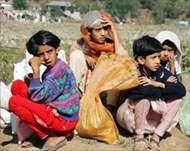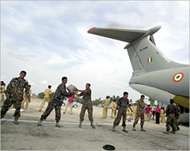Quake aid shortfall upsets aid workers
The world’s failure to come up with quick cash to help save hundreds of thousands of Pakistani quake survivors before winter sets in has left relief officials on the ground baffled and upset.

“We are still of the view that the international community lacks full comprehension of the catastrophe that is looming large,” said United Nations chief aid coordinator Rashid Khalikov.
“We are talking life,” he said one day after a UN conference drew $580 million in aid promises – but only $15.8 million in emergency relief, with the harsh Himalayan winter just weeks away and countless people still living in rubble.
“It may sound strange that we are still talking life-saving two weeks after the disaster, when search-and-rescue operations have largely finished,” Khalikov said in the destroyed city of Muzaffarabad, capital of Pakistan-administered Kashmir.
“But communities that live in the affected areas have become so vulnerable that it is absolutely important for us to reach them with help,” he said. “And we will stay in this life-saving mode, I’m afraid, for the next six months.”
Spectre of hunger
Relief workers fear that as many people will die of hunger and exposure during the bitter winter as in the 8 October quake which killed at least 54,000 people in Pakistan and 1300 in Indian Kashmir.
 |
|
Many remote areas in disputed |
Winter will descend in four weeks. By then, about three million people will have to have find shelter, with food stockpiled to see them through to spring.
It is an operation that experts say is more difficult than that which followed last year’s Indian Ocean tsunami, a catastrophe which prompted a torrent of aid.
However, all but a small amount of the money pledged at the UN conference in Geneva on Wednesday was for reconstructing the flattened villages of Pakistani Kashmir and neighbouring North West Frontier Province.
“It’s a little bit frustrating, to tell you the truth,” said World Food Programme spokesman Khaled Mansour.
“Compared with other crises of the same magnitude this is more complex in terms of logistics and the response of donors has definitely been disappointing.”
Agencies strapped
Starting on reconstruction work is months away.
“It is, in my view, not right to sit with reconstruction money for one year from now if we’re not sure whether those people will be alive one year from now,” UN aid chief Jan Egeland said in Geneva.
Some UN agencies had run out of cash, Egeland said after a conference preceded by a clamour of complaints that the world was not helping enough.
 |
|
Delays in aid cost lives, says UN |
Earlier this week, Egeland wrote in the Wall Street Journal: “The way we currently finance humanitarian aid is anything but speedy. Delays cost lives. We can, and must, do better.”
Khalikov said UN officials would now have to go directly to governments, especially Muslim countries in the Middle East, to plead for cash.
“I am sure we have enough capacity to respond, we just need funding,” he said.
Indian pledge
Against this grim backdrop, India disclosed on Thursday that it had pledged $25 million in relief assistance to its arch-rival Pakistan for earthquake victims at the donors’ conference in Geneva.
 |
|
India has raised its relief |
“The government of India has offered assistance of $25 million for relief and rehabilitation of earthquake victims,” Indian Foreign Ministry spokesman Navtej Sarna announced in New Delhi.
“The government of Pakistan will be welcome to use this contribution for rebuilding homes and rehabilitating people,
reconstructing the infrastructure and restoring essential services,” he said.
On Thursday China promised an additional $13.8 million in unconditional aid, including cash.
“The Chinese government and people will make further efforts to help Pakistan to overcome the disaster brought by the earthquake,” Foreign Ministry spokesman Kong Quan said.
Landslides
Underlining the magnitude of the task, bad weather in the mountains grounded the vital helicopter fleet at the main airbase near Islamabad on Wednesday and for part of Thursday, leaving only mules and people to carry supplies up into the hills.
 |
|
Mules are being used to ferry |
The few roads into the mountains have been blocked by landslides or swept away. Some will take weeks to repair, leaving helicopters as the main means of delivering food and shelter.
But the fleet, although growing, cannot reach them all, or deliver enough.
About 450,000 winter tents are needed, nearly 100,000 have been distributed and another 200,000 are in the pipeline, aid officials say.
That leaves them 150,000 short and not knowing where to find them before what UN Secretary-General Kofi Annan told the Geneva conference would be a “winter without pity”.